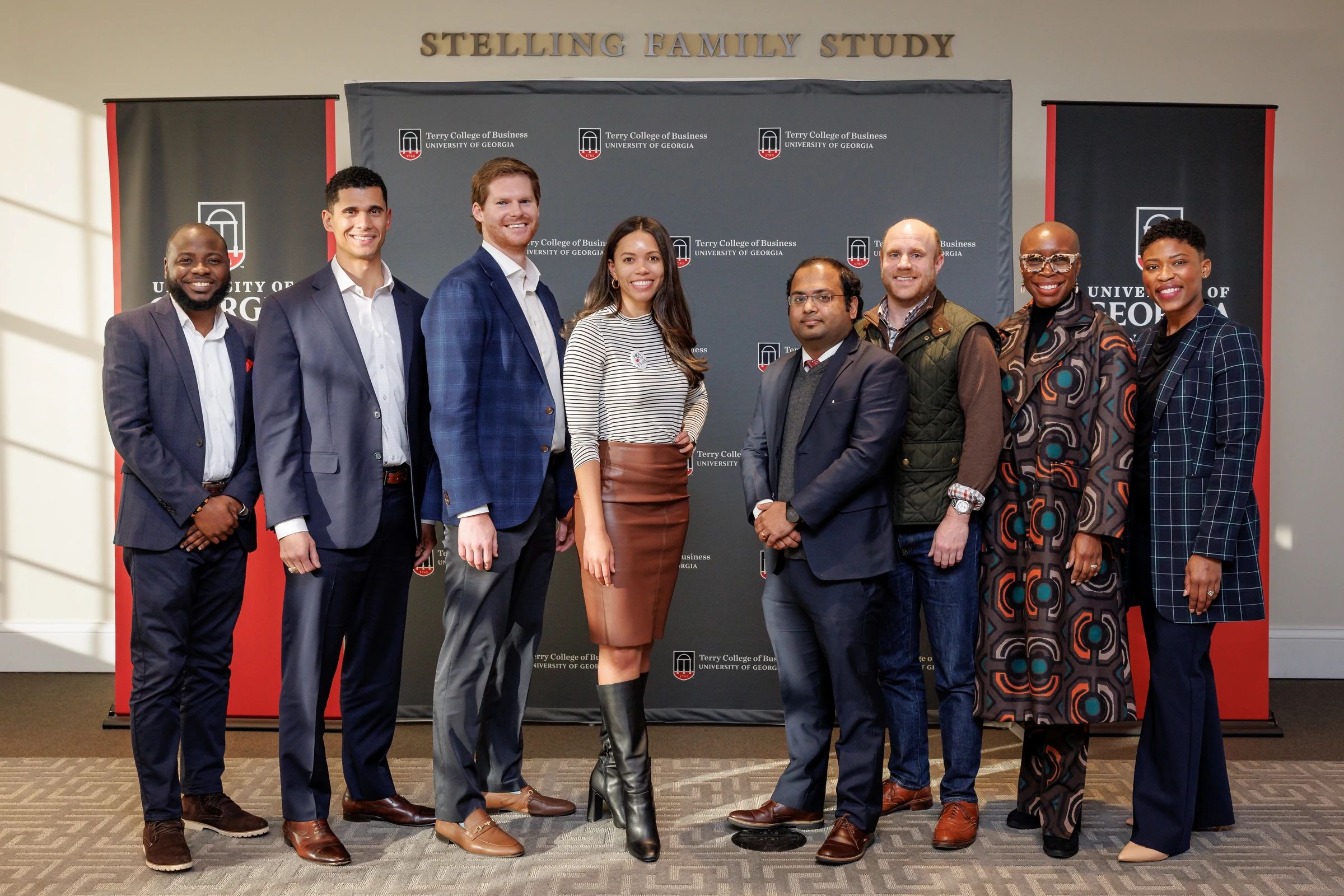As part of the University of Georgia’s campuswide diversity and inclusion excellence strategic plan, the Terry College Diversity & Inclusion Advisory Board developed a five-year plan focusing on key strategies in community outreach and equitable access for the college’s students, faculty, and staff. The plan outlines several goals and actions to enrich and sustain diversity and inclusion excellence within UGA and theTerry College of Business. Underrepresented students include females in Terry majors and programs with less than 50% female representation, minority students, first-generation students, and students from rural areas across all Terry undergraduate majors and graduate programs.
Inclusive Excellence Priorities
I: Building an Inclusive Living/Learning Environment that Supports Access and Success for Diverse Students
UNIT GOAL 1: PROMOTE ACADEMIC ACCESS AND SUCCESS FOR ALL STUDENTS, WITH PARTICULAR CONSIDERATION FOR UNDERREPRESENTED STUDENTS.
Unit Level Actions:
- Develop and expand mentoring and engagement efforts with newly recruited UGA students (freshmen and sophomores).
- Support graduate programs in their efforts on recruiting, student culture and engagement.
- Expand Double Dawgs programs and collaborations with the PhD Project and UGA’s Office of Institutional Diversity.
Key Performance Indicators:
- Number of underrepresented students in Terry majors and programs (graduate and undergraduate).
- Applicants from UGA Graduate School Feeder program, Double Dawgs programs, and the PhD Project.
UNIT GOAL 2: INCREASE NEED-BASED STUDENT SCHOLARSHIPS FOR UNDERGRADUATE AND GRADUATE EDUCATION.
Unit Level Actions:
- Expand need-based aid to lower entry barriers for first-generation students, students from low-income and under-resourced backgrounds.
Key Performance Indicators:
- Total amount (in dollars) of need-based scholarships for undergraduate and graduate students.
UNIT GOAL 3: EXPAND RESOURCES TO PROMOTE INCLUSIVE LEARNING ENVIRONMENTS.
Unit Level Actions:
- Provide support materials in the undergraduate and graduate curriculum that incorporate a diverse set of industries, businesses, and leaders (e.g., access to SAGE case repository, mini-grants for instructional support).
- Expand sections of BUSN 4650: Diversity in a Global Environment and promote the class as an upper-level elective available to all majors.
- Provide professional development opportunities for faculty and staff that promote an inclusive, positive learning environment.
- Provide professional development opportunities for student organization leaders to foster inclusivity.
- Encourage students, faculty and staff to complete the Workforce Diversity Certificate program.
- Highlight programs and resources at undergraduate and graduate orientations that build community. Expand student participation in engagement events.
- Encourage faculty to add inclusive excellence statement to course syllabi.
Key Performance Indicators:
- Student enrollment in BUSN 4650.
- Number of Workforce Diversity Certificate Program completions.
UNIT GOAL 4: EXPAND MENTORSHIP FOR UNDERREPRESENTED STUDENTS.
Unit Level Actions:
- Expand underrepresented mentors within UGA Mentor programs.
Key Performance Indicators:
- Number of underrepresented alumni in UGA Mentor programs.
II: Recruiting and Retaining a Diverse Workforce to Advance Our Mission in the 21st Century
UNIT GOAL 1: INCREASE NUMBER OF UNDERREPRESENTED AND UNDERSERVED FACULTY, STAFF, GRADUATE ASSISTANTS AND STUDENT WORKERS
Unit Level Actions:
- Require chairs of search committees and unit or program heads to complete UGA training programs related to recruitment of staff and faculty.
Key Performance Indicators:
- Number of department heads and search committee chairs completing UGA’s training programs related to recruitment of faculty and staff.
- Number of outlets (outside UGA) where staff positions are posted.
Note: Outside of UGA Jobs, faculty jobs are automatically posted by UGA HR in The Chronicle of Higher Education, Insight for Diversity, and Inside Higher Ed. Staff positions are automatically posted in Inside Higher Ed.
UNIT GOAL 2: EXPAND COMMUNITY BUILDING PROGRAMS AND ACTIVITIES FOR FACULTY AND STAFF, WITH A PARTICULAR FOCUS ON UNDERREPRESENTED POPULATIONS.
Unit Level Actions:
- Establish multicultural events for faculty and staff.
- Encourage the participation of faculty and staff in events that build community with appropriate accommodation in the work schedule.
Key Performance Indicators:
- Number of participants at community building and multicultural events (through RSVP data).
UNIT GOAL 3: EXPAND SUPPORT AND RECOGNITION FOR FACULTY AND STAFF DIVERSITY AND INCLUSION EFFORTS.
Unit Level Actions:
- Establish new faculty and staff awards and grants to recognize efforts to foster a diverse and inclusive environment at Terry.
Key Performance Indicators:
- Number of awards and grants for faculty and staff related to community building.
III: Expanding Partnerships and Outreach to Strengthen Diverse Communities
UNIT GOAL 1: INCREASE THE VISIBILITY OF TERRY COLLEGE OF BUSINESS IN THE EDUCATIONAL PIPELINE OF UNDERSERVED COMMUNITIES.
Unit Level Actions:
- Expand outreach at targeted schools (including Athens area).
- Expand the Accelerated Summer Business Program as a residential pathway program for underrepresented high school students, focusing on college preparation, professional development and mentorship, and exposure to business education.
- Participate in UGA’s All Georgia program.
Key Performance Indicators:
- Number of outreach engagements at targeted schools.
- Overall, underrepresented and underserved student participation in Terry summer programs. Track enrollment of Terry summer program attendees to UGA (total, underrepresented , and underserved)
UNIT GOAL 2: BUILD PARTNERSHIPS AND OUTREACH WITH DIVERSE COMMUNITIES.
Unit Level Actions:
- Engage businesses and nonprofits serving underserved populations in Terry service-learning and consulting projects.
Key Performance Indicators:
- Number of businesses and nonprofits in Terry service-learning and consulting projects that serve underrepresented and underserved communities
UNIT GOAL 3: EXPAND EXPERIENTIAL LEARNING (EL) OPPORTUNITIES IN RURAL GEORGIA AND OTHER UNDERSERVED AREAS.
Unit Level Actions:
- Expand applied and service-learning opportunities in rural and underserved areas in Georgia.
Key Performance Indicators:
- Number of students participating in applied and service-learning opportunities in rural Georgia and underserved areas.
UNIT GOAL 4: EXPAND TERRY’S COMMUNICATIONS AND OUTREACH EFFORTS ACROSS GEORGIA AND THE WORLD.
Unit Level Actions:
- Use Terry news site, alumni publications and social channels to routinely tell and highlight diverse stories of students, faculty, staff, and alumni.
Key Performance Indicators:
- Number of features highlighting a diverse variety of Terry students, faculty, staff, and alumni.

